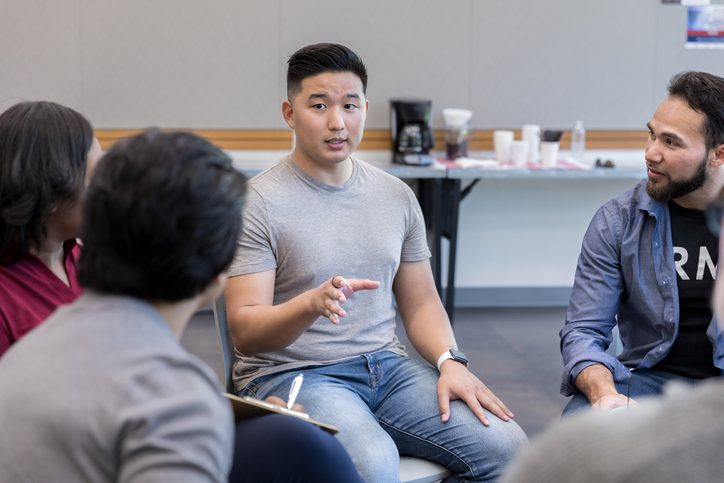Have you ever been to a 3D movie? Even if you haven’t, you likely know what we are talking about: a movie filmed so that when you watch it through some special glasses (usually red in one lens and blue in the other), things on the screen look as though they are coming out of the world of the movie and directly toward you. The images look like they exist in three dimensions—height, width, and depth.
Though 3D films still pop up from time to time, the heyday of the form was in the early 1950s—and so you might be wondering why we are bringing these movies up now.
That’s a fair question. And the answer is simple: Thinking about 3D movies is a good way to quickly grasp what The Farley Center’s tridimensional treatment approach is all about. In the case of our approach to the treatment of substance use disorders, the three dimensions are not height, width, and depth. They are body, mind, and soul.
This three-dimensional model of treatment for substance use disorders is built on a comprehensive and holistic framework that takes into account the various aspects of a person’s life. At the heart of this idea is the notion that addressing the physical aspects of addiction, while crucially important, is insufficient. The Farley Center’s multidisciplinary team ensures that our approach to treatment is designed to engage with your whole person.
Let’s take a look at the three dimensions of The Farley Center’s substance use disorder treatment program.
The Biological Dimension
When you ingest drugs or alcohol, the substances inevitably have an impact on your body. The biological dimension of tridimensional treatment focuses on the ways in which your physical self is damaged by ongoing substance use.
This dimension is also concerned with the development of tolerance, the rigors of withdrawal, and the role genetics can play in increased susceptibility to developing a substance use disorder.
Biological interventions include detoxification in a safe environment, medication-assisted treatment (MAT) to help see you through withdrawal, and medical monitoring to address physical health issues that may have developed as a result of substance use.
The Psychological Dimension
Substance use disorders can have as devastating an effect on the mind as they do on the body. The psychological dimension of the tridimensional approach to treatment is concerned with the emotional and cognitive impacts of an addiction to drugs or alcohol.
Through therapy and counseling, a person in treatment at The Farley Center learns about the underlying causes of their substance use disorder, is taught ways to cope with cravings and to lessen the impact of triggers, and learns to employ healthy coping strategies that will serve them well in sobriety.
This dimension also grapples with co-occurring mental health disorders—like anxiety, depression, or a disorder based in trauma—that may be intertwined with your substance use disorder. The Farley Center finds the therapeutic approach best suited for each person’s needs. Potential approaches include cognitive behavioral therapy (CBT), dialectical behavior therapy (DBT), and motivation enhancement therapy (MET).
The Social Dimension
Earlier in this entry, we listed the third dimension of the tridimensional approach as the soul. So you might be surprised to see the word “social” in the header to this section. But this dimension does involve many of the aspects of life that are fulfilling to what might be called our soul.
This dimension recognizes the influence of social and environmental factors on addiction. It also brings attention to the impact of relationships, family dynamics, social support, and external stressors on a person’s development of a substance use disorder. In the social dimension, treatment often includes family therapy, support groups, vocational and life skills training, and assistance in rebuilding social connections and support networks. And those things, you might say, are good for your soul.
The Key Components of Tridimensional Treatment
To provide high-quality care that is both well rounded and effective, The Farley Center approaches treatment with some key principles firmly in mind. They include:
- Assessment to determine specific needs to inform development of a treatment plan.
- Integration of biological, psychological, and social interventions to create an effective treatment plan.
- Holistic care that recognizes and values the whole person and focuses on more than just their substance use.
- Long-term focus that recognizes that recovery is an ongoing process.
- Individualization so that treatment plans are tailored to each individual’s unique needs.
- Continuing care and support to help prevent relapse.
The Farley Center Can Help You Get and Stay Sober
The Farley Center, located in Williamsburg, Virginia, is a 12 Step and medication-assisted program that helps individuals achieve long-term sobriety. We provide detoxification and short-term stabilization in a residential setting as well as a partial hospitalization program. If you are ready to make a transformational change in your life by regaining and maintaining your sobriety, we are ready to help.


